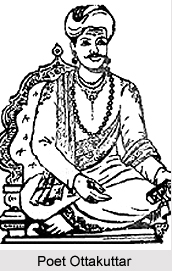 Ottakuttar was a great Tamil poet of Chola period. He was a contemporary of another great Tamil poet Kamban, who wrote Tamil Ramayana. Ottakuttar belonged to a poor family in a small village named Malari. He was known as `Kuttan` in his early life.
Ottakuttar was a great Tamil poet of Chola period. He was a contemporary of another great Tamil poet Kamban, who wrote Tamil Ramayana. Ottakuttar belonged to a poor family in a small village named Malari. He was known as `Kuttan` in his early life.
Ottakuttar composed the `Nalayirakkovai`, which he wrote to praise his patron Gangeya. Gangeya discovered his talent and encouraged him to proceed with his compositions. Soman, who stayed near present day Puduchery, also offered his patronage to Ottakuttar in later period. He also became the poet of three successive Chola kings namely Vikrama Chola, Kulo-ttunga Chola II and Rajaraja II. Ottakuttar composed antila, which is a conventional literary form (together called Muvar-Ula) for all these three kings.
The `Kulottunjja-solan-pillai-tamil`, which is well known for its sentiment and articulacy, was also composed by Ottakuttar. It describes all about the historic value and much information on the wars fought during the period, other achievements of the kings, descriptions of ministers and other powerful men of the realm, etc. Ottakuttar also composed the Etti-vezlmpadu, which has seventy verses praising the spear. Another composition of him `Eluppezbu-padu` has seventy stanzas, believed to have been composed to bring back to life a hundred and eight young men who had been sacrificed. The `Takkaya-gapparani` of Ottakuttar revolves around a Puranic theme.
Ottakuttar was a great devotee of the Goddess Saraswati, the deity of learning. Ottakuttar used to perform penance to this Goddess in Kuthanur. As per the traditional accounts, he was closely associated with this place. He turned to a well-known poet in later period of his life with the blessings of the Goddess Saraswathi. And the village `Kuthanur` was later named as `Kutiianur` after the name of Ottakuttar. It is also believed that Ottakuttar composed the `Saraswathi-Andhadbi` in praise of this Goddess.













